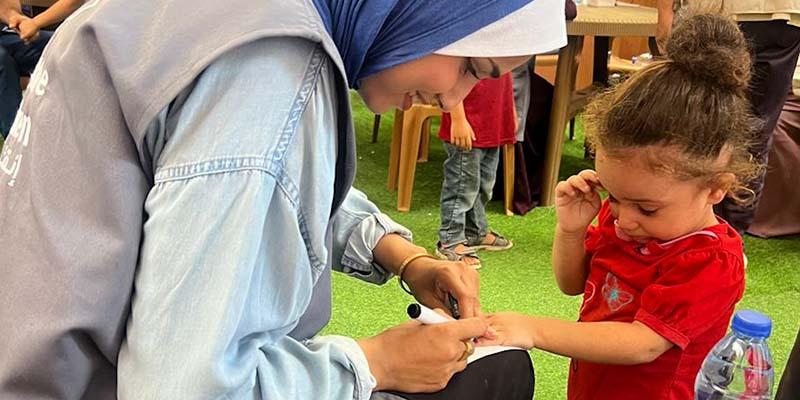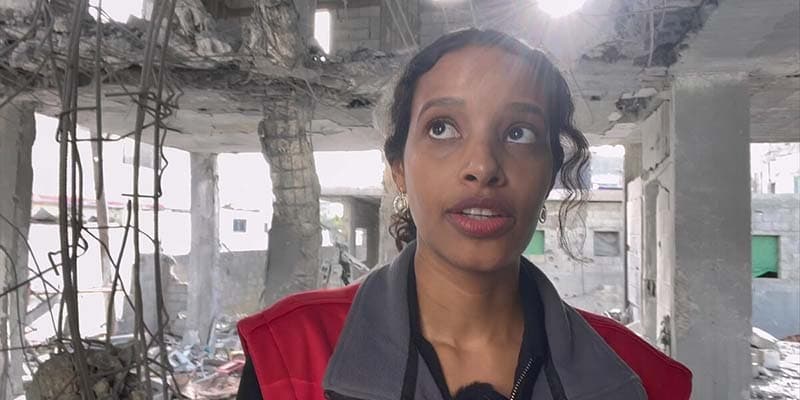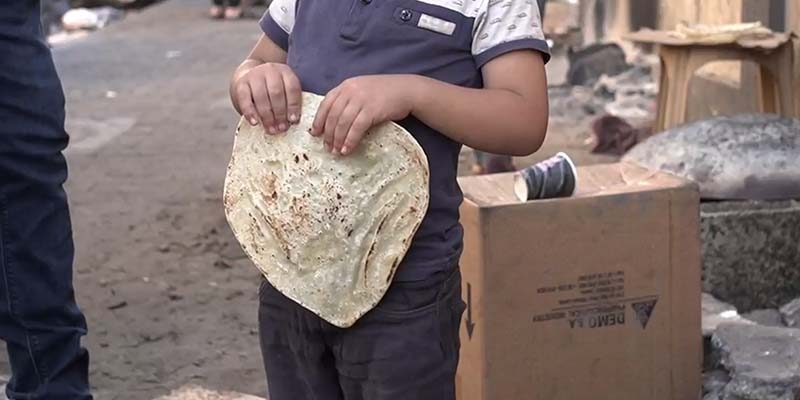
In Gaza, the damage to the education infrastructure pales in significance to the impact this conflict is having on children’s mental health and emotional wellbeing. Photo credit: Bissan Owda/ Save the Children
Gaza's Children Are Forced to Learn how to Survive Bombs and Hunger
By David Skinner , January 24, 2024
Children in Gaza are not learning to become the next generation of scientists and artists. Instead, they are being forced to learn to survive one of the most destructive bombing campaigns in history, as well as one of the worst hunger crises anywhere in the world.
Across the Gaza Strip, hundreds of teachers have been killed and about 75% of schools, colleges, and universities have been completely destroyed or damaged, including Israa University in Gaza City, a learning center for more than that was . Many of the schools, colleges and universities remaining are being used as shelters for the more than 1.9 million people who have been forced to flee their homes. Children have not attended school for more than 100 days.
Almost all education equipment – chairs, desks, whiteboards, textbooks – has been destroyed, either due to relentless bombardments or by desperate civilians who burn the equipment just to be able to cook food and keep warm.
There are also the attacks on Gaza’s libraries, museums, art galleries and historical sites. These places are part of a wider educational context within which Palestinian children develop a sense of self, and an understanding of their history and heritage and its place in the world. But these places are being destroyed, thus removing the cultural environment within which Palestinian children develop.
Even as someone with decades of experience working in some of the worst crises, (Afghanistan, Ukraine and Cox’s Bazar, the world’s largest refugee camp) it is difficult to comprehend just how devastating this war has been on Gaza’s education system. It will be a long time before children are able to return to a classroom. It will be much longer before a properly functioning education system can be rebuilt.
But the damage to the education infrastructure pales in significance to the impact this conflict is having on children’s mental health and emotional wellbeing. Even before this current conflict, more than half of parents and caregivers consulted across the Gaza Strip for a ��ɫ��Ƶstudy reported that their children had contemplated suicide and three out of five were self-harming. The situation now will be significantly worse.
Despite the challenges before the conflict escalated, Palestinian children were educationally successful. Something that is both heartening and devastating, given the situation today. The determination of Palestinian children to learn is astonishing - more than 95% of children across Palestine are enrolled in basic education and literacy rates are higher than in Hong Kong and Singapore. Organizations, such as Save the Children, are doing what they can in extremely difficult conditions to support children.
Agencies are also preparing for the time when there is safe and secure access.
The long-term physical rebuilding of the hundreds of educational sites will take time – consider the amount of unexploded ordnance that will need to be cleared before rebuilding can even begin - and will be expensive. Hundreds of temporary learning centers in tents or prefabricated structures will be required. There will need to be a massive resupply of education equipment.
But that challenge is simple compared to the almost inconceivably complex task of undoing the mental harm perpetrated against more than a million children. Children who had already been pushed to the brink and who have suffered so much more since.
Gaza's children will need educational spaces that are welcoming, friendly and safe for all children, including the thousands of children who have been left permanently disabled – physically and mentally - by this war and will require specialist care. They will require teachers who have been trained to support children with extensive exposure to stressful and traumatic events and counsellors and specialists who can provide more advanced treatment. The teachers themselves will need to be supported as they return to work after experiencing their own personal trauma, including the likely loss of homes and loves ones.
The children will need the best home set-up and support system possible – an unimaginable challenge considering the thousands of children left without parents and families and the decimation of existing alternative care options.
And they will need a curriculum that allows them to catch up on the learning they have missed, but also recognizes the deeply traumatic experiences they have endured.
This will be difficult and will take a long time to achieve. However, there is one thing that can be done immediately. One thing that would have a major impact on children’s mental health, let alone save thousands of lives. One thing that would be easily achievable if it weren’t for lack of political will – and that is an immediate and permanent ceasefire.



